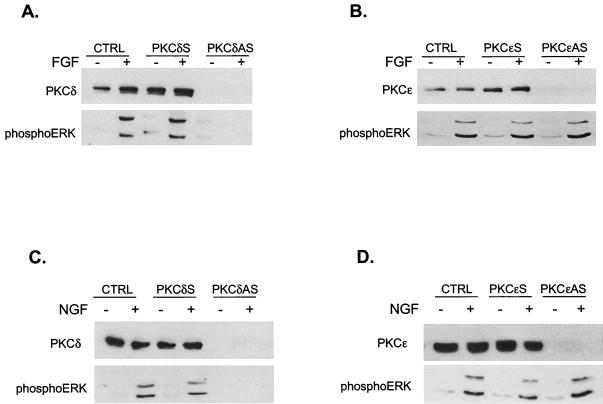FIG. 7.
PKCδ but not PKCɛ is required for FGF-induced ERK activation. (A) Antisense (AS) PKCδ phosphorothioate ODNs block PKCδ expression and ERK activation in H19-7 cells. Cells were pretreated with either sense or antisense PKCδ ODNs as described in Materials and Methods and then either left untreated (CTRL) or were stimulated with 10 ng of FGF per ml for 10 min. Cells were then lysed, and the lysates were resolved by SDS-PAGE (10% polyacrylamide) and assayed for PKCδ expression by immunoblotting with anti-PKCδ antibody. MAP kinase activation was assayed by immunoblotting with anti-phospho-ERK antibody. (B) Antisense PKCɛ phosphorothioate oligonucleotides block PKCɛ expression, but do not inhibit ERK activation in H19-7 cells. Cells were pretreated with either sense or antisense PKCɛ oligonucleotides as described in Materials and Methods and then either were left untreated or were stimulated with 10 ng of FGF per ml for 10 min. Cells were then lysed, and the lysates were resolved by SDS-PAGE (10% polyacrylamide) and assayed for PKCɛ expression by immunoblotting with anti-PKCɛ antibody. MAP kinase activation was assayed by immunoblotting with anti-phospho-ERK antibody. (C) Antisense PKCδ phosphorothioate oligonucleotides block PKCδ expression and ERK activation by NGF in PC12 cells. PC12 cells were treated and analyzed as for panel A, except that 50 ng of NGF per ml was used instead of FGF. (D) Antisense PKCɛ phosphorothioate oligonucleotides block PKCɛ expression but do not inhibit ERK activation by NGF in PC12 cells. PC12 cells were treated and analyzed as for panel B, except that 50 ng of NGF per ml was used instead of FGF.

